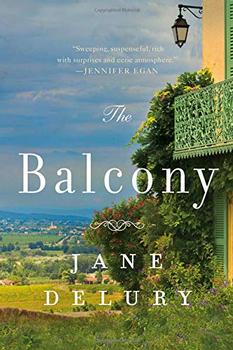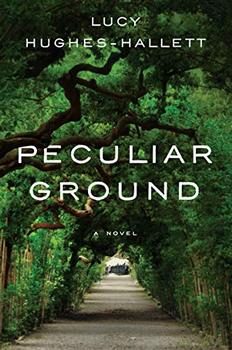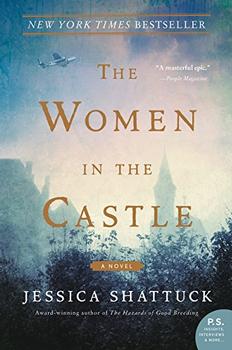Summary | Excerpt | Reviews | Beyond the book | Read-Alikes | Genres & Themes | Author Bio

The premise of The Balcony seems simple: a French country estate plays host to families and their dramas throughout the twentieth century. Yet Jane Delury takes this straightforward concept and weaves a complex and unpredictable story filled with hardship, heartache, tragedy, mystery and hope. The narrative often takes unexpected turns, veering through history to slowly reveal one small fiber of an intricate, interconnected web.
The book begins in 1992 with an American au pair, Brigitte, as she arrives in Benneville, a fictional town outside of Paris. She immediately experiences disappointment when her image of the French countryside, "informed by the paintings of the impressionists and by novels such as Madame Bovary," unfolds as "an industrial wash of smokestacks and faceless apartment buildings." The town's historic center was decimated by a bomb during World War II and the Seine, "that same river that glided through Paris…looked sullen and stagnant in Benneville."
Through Brigitte's eyes, we first view the country estate where her charge, four-year old Elodie, lives with her father, Hugo, and mother, Olga. The bourgeois manor, surrounded by a beautiful forest rather than the adjoining town's factories, was made "of buttery limestone that stretched three stories into slate turrets and gables." It had "once been magnificent" but then "cheaply remodeled in the 1970s."
Olga inherited the estate after a lengthy legal battle following World War II. Her parents, Jewish immigrants who bought the estate during the war in hopes the countryside would prove to be safe, were arrested by the Gestapo, sent to Drancy (see 'Beyond the Book') and most likely died at a concentration camp. On Brigitte's first night, Olga relays the history of the house and grounds and what she describes as its inevitable decline.
From this point on, the manor's residents and many others – the strict schoolmaster who lives in the former servant's house, his sons, their families and a girl who took piano lessons at the manor – contribute a unique story that inevitably links them to the estate. While the sheer number of these characters is at times overwhelming, Delury expertly navigates the constant change in perspective in each chapter, using third person to deeply explore each person's inner dialog.
While the entire novel does not take place at the estate, it does serve as the structure to which Delury's web of characters attaches itself. As the characters move to Grenoble, Paris, Belle-Ile, or vacation in Tahiti, their thoughts and memories inevitably meander back to the estate. At times the manor seems to be an inescapable beacon of misfortune and mystery. Tragedy befalls several of the characters and an eerie atmosphere envelopes the estate, beginning with an ex-courtesan who mysteriously jumps from the three-story balcony and dies. This coincides with an eclipse, viewed as "a shadow…spreading from the roof of the manor, blotting out the sky as it went." This dark imagery and sense of dread echo Olga's view that the estate declined after its initial owners. Indeed, these gothic undercurrents are reflected in the various stages of the manor: vacant and looted after the Gestapo arrest Olga's parents, or old and decaying as the current owners attempt the physical and financial burdens of its upkeep.
But categorizing Delury's novel as "gothic" would simplify and omit the complex discussions around location it presents. Olga does not believe the place to be cursed but instead points out "that life is difficult and people can be cruel." Brigitte also does not believe that places are cursed, but that they could feel so. After all, her obsession with living in France began after her suburban American "landscape became sinister." This discussion begins to challenge the traditional gothic associations with place, exploring instead the different human interactions associations assigned to it.
This idea is reflected throughout. At one point, three characters vacation in Tahiti. After the danger of a shark passes without incident, another tourist says, "You come to a place like this…and you think nothing bad can happen." Here, humans project their own emotions onto a place. The island simply possesses the experiences and emotions infused into it by an individual person.
Similarly, the estate is not necessarily "good" or "bad." Delury challenges our assumptions by providing a messy, complicated view of place fraught with individual emotions and stories rather than a cohesive narrative of an inherently benevolent or evil location. In this sense, the estate reflects the characters that tell its story: complex, flawed human beings with both positive and negative qualities. This sweeping generational drama is perfect for readers looking for a modern take on the gothic novel. The Balcony similarly offers a new voice on an old genre. Delury's gothic reimagining reflects the complicated world we live in and the complicated people in it, just as we infuse our humanity – both good and bad – into the world.
![]() This review was originally published in The BookBrowse Review in April 2018, and has been updated for the
March 2019 edition.
Click here to go to this issue.
This review was originally published in The BookBrowse Review in April 2018, and has been updated for the
March 2019 edition.
Click here to go to this issue.

If you liked The Balcony, try these:

by Lucy Hughes-Hallett
Published 2019
The Costa Award-winning author of The Pike makes her literary fiction debut with an extraordinary historical novel in the spirit of Wolf Hall and Atonement - a great English country house novel, spanning three centuries, that explores surprisingly timely themes of immigration and exclusion.

by Jessica Shattuck
Published 2018
Three women, haunted by the past and the secrets they hold.
Your guide toexceptional books
BookBrowse seeks out and recommends the best in contemporary fiction and nonfiction—books that not only engage and entertain but also deepen our understanding of ourselves and the world around us.